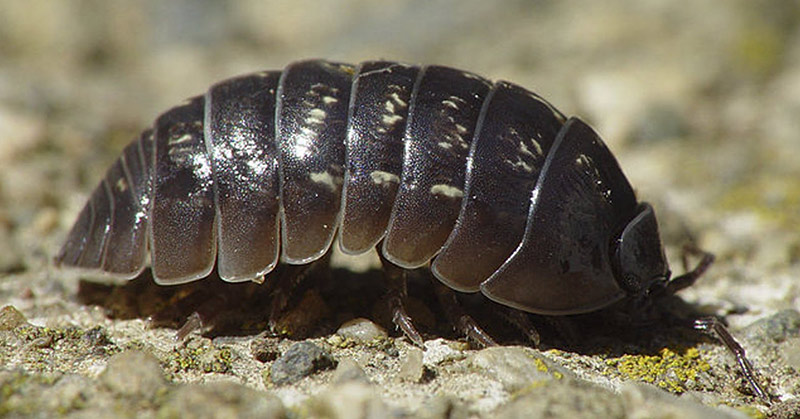If you’ve ever picked up a brick or a piece of wood that’s been lying in the dirt for a while, you’re probably familiar with the tiny critters with the hard black shell you found attached to the bottom of it. These humble little creatures that curl up into a ball when prodded may seem insignificant, but they are actually the heroes of your garden and have a greater environmental role than you might think.
Rollie-Pollies
The scientific name for these tiny creatures is Armadillium vulgare, but they are often referred to as Pill Bugs, or more affectionately, “Rollie-Pollies”, due to their ability to roll up into a ball when threatened. The truth is, however, they are not bugs at all- they are crustaceans. They are more closely related to crabs and shrimp than to insects [1,2].
Pill bugs are the only crustaceans that have adapted completely to living on land [3]. They have no need to excrete ammonia-laden waste out of their bodies, so they do not urinate, but they do eat feces– even their own [4].
They drink using tube-like structures from their rear-ends, and they breathe through gills. This is why they live in moist environments. If their gills dry out, they would be unable to breathe, so they roll into a ball to protect whatever moisture they have on their gills [4].
Pill Bugs are Good For Your Garden
If you have a mature garden, Pill Bugs are very beneficial to you. This is because Pill bugs are detrivores, which means that they feed on dead organic material, such as plant debris. Fully decomposed plant debris returns nutrients to the soil, helping your garden to thrive [5].
Read: Woman Shares Photos of an Amazing Flower-Like Bug That Looks like A Work of Art
Pill Bugs Eat Metals
Not only do pill bugs feed on dead organic matter, they also remove metal and heavy metal ions from contaminated soil. Their ability to take up soil pollutants like lead, cadmium, arsenic, copper, and zinc, and crystalize them in their bodies makes them able to survive in environments where other species can’t [4].
This makes them particularly useful in coal spoils and slag heaps, and as well as in re-establishing healthy soil [1].
Their clean-up capabilities also mean they could have a protective effect on groundwater since chemical contaminants in soil and rocks have the potential to each into the groundwater. This has important implications for human health because water that contains high amounts of these chemicals is no longer suitable for drinking [6].
How to Work With Pill Bugs in Your Garden
Pill bugs are helpful additions to your garden, but it is important that you create a good environment for them to do their work. You usually don’t have to worry about them eating your plants since they feed off of dead organic matter, but they will sometimes go after the plant’s roots. To avoid this problem, add organic matter to your soil regularly in order to keep them busy [7].
An Unassuming Hero
Although they look prehistoric, Pill Bugs are unassuming heroes, cleaning up soil and potentially protecting groundwater. They can even play a small role in slowing climate change by eating fungus, which decreases the amount of carbon dioxide that is released into the atmosphere [8]. Rollie-Pollies are yet another example of a natural way to improve the health of our environment.
Keep Reading:
How to Keep Bugs Out of Your House this Summer (8 Natural Methods)
If You See These 5 Insects in Your Garden, DO NOT Kill Them
Sources
- https://www.greenlivingpdx.com/study-finds-rollie-pollies-remove-heavy-metals-from-soil-protects-groundwater/NeDZz9-yZcaiP-Gvv1EcXGip9YGjw0WDohdtymb9c
- https://eol.org/pages/1021952
- https://entomology.ca.uky.edu/ef439
- https://www.mnn.com/earth-matters/animals/blogs/roly-poly-pill-bug-facts-important-environment
- https://www.sciencedirect.com/topics/agricultural-and-biological-sciences/detritivores
- https://www.epa.gov/sites/production/files/2015-08/documents/mgwc-gwc1.pdf
- https://plantersplace.com/pest-patrol/pill-bugs-are-the-clean-up-crew-in-the-garden/
- https://www.pnas.org/content/112/22/7033.abstract

